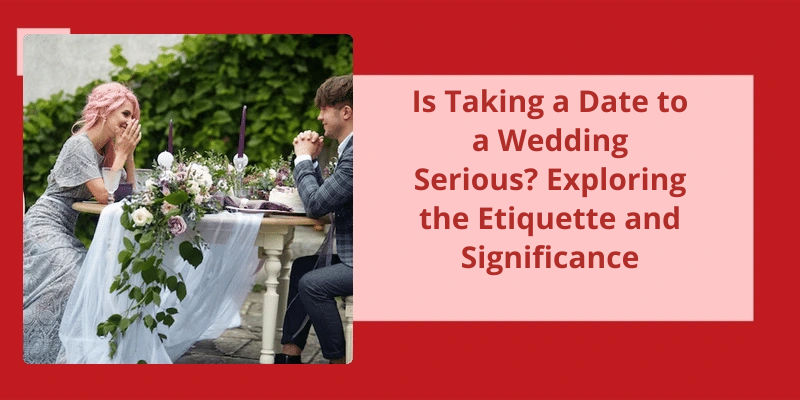The decision to take someone as a date to a wedding isn’t one that should be taken lightly. While it may seem like a fun and exciting idea to introduce a new romantic prospect to your friends and family, it's important to consider the context of the wedding itself. If it's a small, intimate affair with close family and friends, bringing a casual date may be acceptable. However, if you're attending a destination wedding or a larger family gathering, it's best to err on the side of caution and not bring someone whom you don't know very well. Casual dating and relationships can be complicated enough without the added pressure of a formal event like a wedding, where expectations can be high and emotions can run deep. So before you make any decisions about who to bring as your plus-one, be sure to weigh the potential risks and rewards carefully.
Is It OK to Bring Girlfriend to Wedding?
Attending a wedding solo can be lonely and uncomfortable at times, especially if you don’t know many other guests. Asking your girlfriend to be your plus one is a great way to ensure that you’ve someone to talk to and enjoy the festivities with throughout the day. While inviting her may seem like an obvious choice, some people shy away from bringing their partners for a variety of reasons.
One common concern is that the relationship may not be serious enough to warrant an invitation. However, in most cases, it’s better to err on the side of caution and extend the invitation anyway. After all, it’s always better to have someone there to share in the moment with you, even if the relationship is still relatively new. Additionally, if your girlfriend is someone you care about and see a future with, it’s always good to involve them in important events like weddings.
Another factor to consider is whether you want to follow wedding etiquette. Etiquette dictates that guests should be allowed to bring a plus one, regardless of whether they’re in a serious relationship or not. This is seen as a way of showing respect and making sure that everyone feels comfortable and included in the celebration, regardless of their relationship status.
If you do decide to bring your girlfriend to the wedding, it’s important to communicate with the couple. Let them know that you plan to bring a plus one and ask if there are any special considerations you need to be aware of. For example, some couples may have budget constraints or limited space, so it’s important to be respectful of their wishes and needs.
Finally, remember that weddings are about celebrating love and commitment. As long as you’re respectful and considerate of the couples wishes, theres nothing wrong with inviting her to be by your side as you celebrate this special day with your loved ones.
The Etiquette for Being a Good Plus One at a Wedding, Such as Offering to Help Out or Being Respectful of the Couple and Their Wishes.
- Arrive dressed appropriately for the occasion
- Be on time for the wedding ceremony
- Offer to help out with any tasks or errands the couple might need during the day
- Stay sober and avoid any embarrassing behavior
- Be respectful of the couple and their wishes, including any cultural or religious traditions
- Mingle and socialize with other guests, but don’t steal attention away from the newlyweds
- Thank the couple for inviting you and for including you in their special day
- Have a good time and enjoy the celebration!
Attending weddings can be a joyful occasion, but the decision to go without a date can be daunting. While society seems to place a certain level of importance on finding the perfect plus one, it’s important to remember that going solo is perfectly acceptable and even commonplace. So, if you’re questioning whether it’s OK to attend a wedding without a date, rest assured that you’re not alone.
Is It OK to Go to a Wedding Without a Date?
It’s important to remember that weddings are a celebration of love and commitment between two people. While bringing a date can enhance the experience, it isn’t necessary for you to enjoy the festivities. Going solo can provide you with the opportunity to meet new people, catch up with old friends, and even dance the night away without having to worry about pleasing anyone else.
Additionally, attending a wedding without a date allows you to focus solely on the ceremony and the couple, rather than trying to balance your time between your date and the wedding itself. You can fully immerse yourself in the significance of the event and celebrate the couple without any distractions.
While some may feel pressure to bring a date to a wedding, it’s important to remember that the decision ultimately lies with you. If you aren’t currently seeing someone, there’s no need to feel like you’ve to scramble to find a date. Chances are, there will be plenty of others in the same situation as you at the wedding.
In fact, it’s much more common than people may realize. Whether you choose to attend solo or bring a friend, the most important thing is to show up and celebrate the love between the happy couple. Remember, weddings are about sharing in the joy and happiness of others, not about adhering to societal expectations. So go forth, enjoy yourself, and dance like nobody is watching!
How to Be a Good Wedding Guest Without a Date
Attending a wedding without a date can be intimidating, but there are simple steps you can take to make the most of the experience. Dress to impress, arrive on time, mingle with other guests, and be respectful during the ceremony and reception. Make sure to bring a thoughtful gift for the couple, and don’t forget to dance and have fun!
As couples embark on planning their dream wedding, one of the most crucial yet challenging decisions is often choosing the wedding date. The date can significantly impact various aspects of the ceremony, including the tone, season, and availability of the venue. For many soon-to-be-weds, this decision can feel overwhelming, but it’s essential not to rush it. After all, selecting the perfect date can help make your special day even more unforgettable.
Does the Date Matter for a Wedding?
It’s important to take your time to consider all factors before settling on a date that works for both you and your partner. One crucial factor to consider is the season. Many couples prefer to get married during the summer months when the weather is warm and sunny, which can make for a beautiful outdoor ceremony. However, keep in mind that this is peak wedding season, so venues and vendors may be more expensive and difficult to book.
Another important consideration is the availability of your loved ones. If you’ve family and friends who live far away, you may want to consider having your wedding during a holiday or long weekend, making it easier for them to attend. Additionally, youll want to avoid scheduling your wedding during major events, like sports games or festivals, which could cause traffic and other logistical issues.
When choosing your wedding date, it’s also important to think about your own schedule and availability. Additionally, keep in mind that planning a wedding takes time, so make sure to give yourself enough time to complete all tasks and details before the big day.
Asking to bring a guest to a wedding can be a delicate matter. There are certain guidelines to consider before deciding to pop the question. Let’s take a look at the etiquette around asking to bring a plus one to a wedding.
Is It OK to Ask to Bring a Guest to a Wedding?
When you receive an invitation to a wedding, it’s important to read and follow the instructions carefully. If the invitation doesn’t mention anything about bringing a guest, then assume that it’s just for you. Keep in mind that the couple has likely planned and budgeted for a specific number of guests, so asking to bring a guest when it’s not explicitly stated isn’t appropriate.
If you really want to bring a guest to a wedding, consider the reason why you want to bring them. Is it because you don’t want to attend alone, or is it because you genuinely want them to share in this special occasion with you? If it’s the former, you might want to reconsider. Weddings are about celebrating the couples love and commitment, not about providing a social outing for you and your friends.
When you do ask, be sure to do so in a respectful and gracious manner. Dont make demands or put the couple on the spot. Instead, approach them with sensitivity and understanding. Understand that they may have valid reasons for wanting to limit the guest list, such as budget constraints or limited venue capacity. If they say no, accept their decision gracefully and don’t push the issue.
If youre not sure if it’s okay to bring someone, err on the side of caution and assume that it’s not. Remember to be respectful and gracious in your approach, and accept their decision if they say no. Ultimately, a wedding is about celebrating the love and commitment between two people, and not about accommodating every guests individual needs.
Tips for Deciding Who to Bring as a Guest to a Wedding
Wedding guests are an important part of any wedding and can make or break the wedding party. Choosing who to invite can be difficult, but there are a few tips to consider when deciding who to bring. These include considering the budget, the venue capacity, the relationship with the guest, and their behavior at past events. Overall, it’s important to choose guests who’ll be respectful and enhance the experience for everyone attending the wedding.
Source: Wedding Plus One Etiquette Tips for Zero Awkwardness
One of the reasons why people bring wedding dates is for the assurance that they’re actually invited to the wedding. The guest list can be a tricky thing to navigate, but a save-the-date announcement can confirm for friends and family that they’re on the list and can start preparing for the big day. However, there are many other reasons why couples and their guests may choose to bring a date to a wedding.
Why Do People Bring Wedding Dates?
However, for single guests, it can feel a bit awkward not having a plus-one. This is where bringing a wedding date comes in. By having a date to the wedding, the guest doesn’t have to worry about feeling left out or lonely during the event. It can also provide a sense of comfort and security, especially if the guest isn’t very familiar with the other attendees.
Aside from social benefits, bringing a wedding date can also make logistical sense. For example, if the wedding is located in a different city or state, having a designated travel partner can make transportation and accommodation arrangements easier and more cost-effective. Additionally, having a date to the wedding can also alleviate any potential stress of finding a last-minute replacement if the guest is unable to attend.
Attending a wedding together can be a fun and memorable experience for a couple, and can also provide an opportunity for them to meet and socialize with each others friends and families. It can also be seen as a sign of commitment and seriousness in the relationship.
Overall, the decision to bring a wedding date is a personal one and can vary depending on individual circumstances.
Reasons Why Some People Choose Not to Bring a Wedding Date.
There are several reasons why individuals may choose not to bring a wedding date. One possibility is that they may not currently have a significant other or may prefer to attend the wedding solo. Another reason could be that they may not feel comfortable bringing someone they’ve only just started dating or someone who may not fit in well with the other guests. They may also prefer to focus on spending time with the bride and groom rather than worrying about entertaining a guest. Ultimately, the decision to bring a wedding date is a personal one and should be made based on individual preferences and circumstances.
Now that we’ve established why it’s not a good idea to invite someone to just your wedding ceremony and not the reception, let’s discuss an equally important question – is it rude to attend the wedding ceremony and not the reception? Let’s find out.
Is It Rude to Attend the Wedding Ceremony and Not the Reception?
For many people, getting married is one of the most important moments of their lives. It’s a day filled with emotions, traditions, and rituals that are meant to be shared with family and friends. While some couples choose to have a small and intimate ceremony, others opt for a grand celebration with a large number of guests. One of the most common dilemmas that many couples face is whether or not to invite guests to both the ceremony and the reception or just one of them.
If youre planning a wedding, you might wonder if it’s rude to invite someone to only the ceremony and not the reception. Well, the short answer is yes, it’s considered impolite and can be hurtful to the guests. When you invite someone to the ceremony, youre essentially asking them to witness and participate in the moment when you exchange your vows and officially become husband and wife. However, by not inviting them to the reception, youre essentially telling them that theyre not important enough to celebrate with you and the rest of your guests.
There are, of course, situations where it might be acceptable to invite someone to just the ceremony. For example, if youre having a small ceremony with only immediate family members, you might not have the space or budget to invite additional guests to the reception. In this case, it’s important to be upfront with your guests and explain the situation. You can even suggest alternative ways to celebrate with them, such as having a casual post-wedding brunch or drinks.
Etiquette for Wedding Invitations: Should the Reception Be Included in the Invitation or Can It Be a Separate Card?
When it comes to wedding invitations, it’s customary to include all the important details in one envelope. This typically includes information about both the ceremony and the reception. While it’s possible to send a separate reception card, it’s generally not necessary. However, there may be some exceptions depending on the specific circumstances of the wedding. Ultimately, it’s best to consult with the bride and groom or their wedding planner to determine the appropriate etiquette for the situation.
Conclusion
In conclusion, taking a date to a wedding requires thorough consideration and evaluation of the nature of the event. While a local wedding may present an opportunity to bring a casual date, a big family wedding or a destination wedding may not be the place to take someone you hardly know. Casual dating, which involves a physical and emotional relationship devoid of formal commitments, may not be a suitable foundation for this type of event and may result in unfavorable outcomes. As such, it’s important to exercise discretion and make informed decisions when deciding to take a date to a wedding. Ultimately, a great wedding experience is all about having a good time and creating lasting memories, and who you bring can greatly influence the outcome.






